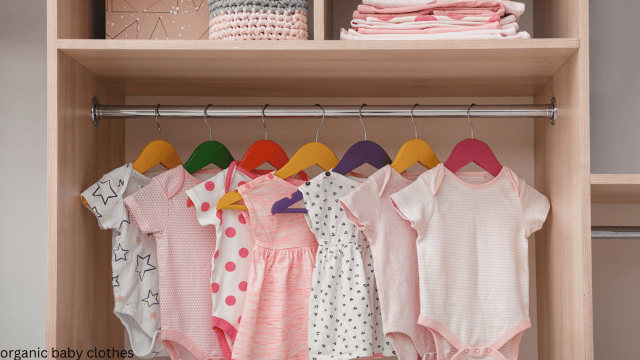Organic baby clothes are garments made from natural, sustainable, and environmentally-friendly materials. These materials are typically grown and processed without the use of harmful chemicals, pesticides, or synthetic additives. Instead, organic fabrics like cotton, linen, and bamboo are cultivated using organic farming methods that prioritize soil health, biodiversity, and ethical labor practices.
Organic baby clothes are designed to provide a safe, gentle, and toxin-free option for clothing your little ones. Unlike conventional baby clothes that may contain traces of harmful substances, organic garments are carefully crafted to ensure the highest standards of purity and safety for your child’s delicate skin and sensitive needs.
Why choose organic baby clothes over conventional options?
As parents, we want the very best for our children, and that includes the clothes they wear. Conventional baby clothes, while often affordable and widely available, can be made with synthetic fibers, dyes, and finishes that may contain harmful chemicals. These chemicals can be absorbed through the skin and potentially cause health issues or irritation for your little one.
In contrast, organic baby clothes are produced with natural, sustainable materials that are gentle on your child’s skin and the environment. By choosing organic, you can have peace of mind knowing that your baby is wearing garments that are free from harsh chemicals, pesticides, and other potentially toxic substances.
Benefits of organic baby clothes for your little ones
- Skin-Friendly: Organic fabrics like cotton, linen, and bamboo are breathable, soft, and hypoallergenic, making them gentle on your baby’s delicate skin. They are less likely to cause irritation, rashes, or allergic reactions compared to conventional fabrics.
- Chemical-Free: Organic baby clothes are manufactured without the use of harmful chemicals, dyes, or finishes, reducing the risk of exposure to potentially toxic substances that can be absorbed through the skin.
- Sustainable and Eco-Friendly: Organic farming practices prioritize environmental sustainability, biodiversity, and ethical labor standards. By choosing organic baby clothes, you’re supporting a more sustainable and eco-conscious industry.
- Durability and Longevity: Organic fabrics are often more durable and long-lasting than their conventional counterparts, making them a more cost-effective and sustainable choice for your growing baby.
- Increased Comfort: The natural breathability and softness of organic fabrics can provide increased comfort and better temperature regulation for your little one, keeping them cozy and content.
- Ethical Production: Organic baby clothing manufacturers often prioritize fair labor practices, ensuring that the workers involved in the production process are treated with dignity and respect.
Understanding the importance of organic certifications and labels
When shopping for organic baby clothes, it’s important to look for reputable organic certifications and labels. These certifications, such as GOTS (Global Organic Textile Standard), OEKO-TEX, or USDA Organic, ensure that the garments have been produced according to strict environmental and social standards.
These certifications verify that the materials used are genuinely organic, the manufacturing process is free from harmful chemicals, and the overall production adheres to ethical labor practices. By looking for these certifications, you can have confidence that the organic baby clothes you’re purchasing are of the highest quality and meet the standards you expect.
Factors to consider when purchasing organic baby clothes
When selecting organic baby clothes for your little one, there are several factors to keep in mind:
- Fabric Quality: Look for high-quality, durable organic fabrics like cotton, linen, or bamboo that will withstand frequent washing and wear.
- Sizing and Fit: Ensure that the organic baby clothes you choose are the appropriate size for your child’s age and stage of development, allowing for comfortable movement and growth.
- Style and Design: Consider the style, design, and functionality of the organic baby clothes, ensuring they meet your preferences and your child’s needs.
- Pricing and Budget: Organic baby clothes may come with a higher price tag, but they can be a worthwhile investment in your child’s health and the environment.
- Brand Reputation: Research and choose reputable organic baby clothing brands that are known for their commitment to quality, sustainability, and ethical practices.
Tips for caring for and maintaining organic baby clothes
Caring for and maintaining organic baby clothes is relatively straightforward, but there are a few tips to keep in mind:
- Gentle Washing: Wash organic baby clothes using a mild, fragrance-free detergent and avoid using harsh chemicals or bleach.
- Air Drying: Whenever possible, air dry organic baby clothes to preserve the integrity of the fabrics and reduce energy consumption.
- Avoid Fabric Softeners: Fabric softeners can contain synthetic chemicals that may be irritating to your baby’s skin. Opt for natural alternatives like vinegar or wool dryer balls.
- Proper Storage: Store organic baby clothes in a cool, dry place, away from direct sunlight, to maintain their quality and longevity.
- Mending and Repairs: If organic baby clothes become worn or damaged, consider mending or repairing them to extend their lifespan and reduce waste.
Where to find and purchase organic baby clothes
Organic baby clothes are becoming increasingly available in a variety of retail and online settings. Some popular options for purchasing organic baby clothes include:
- Specialty organic clothing stores, both brick-and-mortar and online
- Eco-friendly and sustainable baby boutiques
- Major retailers with dedicated organic baby clothing sections
- Direct-to-consumer organic baby clothing brands
- Second-hand or consignment shops that carry organic baby clothes
When shopping for organic baby clothes, be sure to research the brands, certifications, and production methods to ensure you’re making an informed and ethical choice.
The environmental impact of organic baby clothes
The production of organic baby clothes has a significantly lower environmental impact compared to conventional baby clothing. Organic farming practices prioritize soil health, water conservation, and biodiversity, reducing the use of harmful pesticides and synthetic fertilizers.
Additionally, the manufacturing process for organic baby clothes typically involves less energy consumption, water usage, and greenhouse gas emissions. By choosing organic, you’re not only protecting your child’s health but also contributing to a more sustainable future for our planet.
sustainable practices in the baby clothing industry
When you choose organic baby clothes, you’re not just making a purchase – you’re supporting a movement towards more ethical and sustainable practices in the baby clothing industry. By voting with your dollars, you’re encouraging brands to prioritize environmental stewardship, fair labor policies, and the well-being of both children and the planet.
Your choice to invest in organic baby clothes sends a powerful message to the industry, demonstrating the growing demand for responsible and eco-conscious products. As more parents like yourself make the switch to organic, the industry will be compelled to adapt and improve its practices, leading to a more sustainable and equitable future for all.
Conclusion:
As parents, we have the opportunity to make a profound impact on the health and well-being of our children, as well as the environment they will inherit. By choosing organic baby clothes, we are not only providing our little ones with the safest and gentlest garments, but we are also supporting a more sustainable and ethical future for our planet.Investing in organic baby clothes is a decision that will pay dividends for years to come. Take the first step towards a healthier, more sustainable future for your family by exploring our selection of high-quality, organic baby clothing options today.











